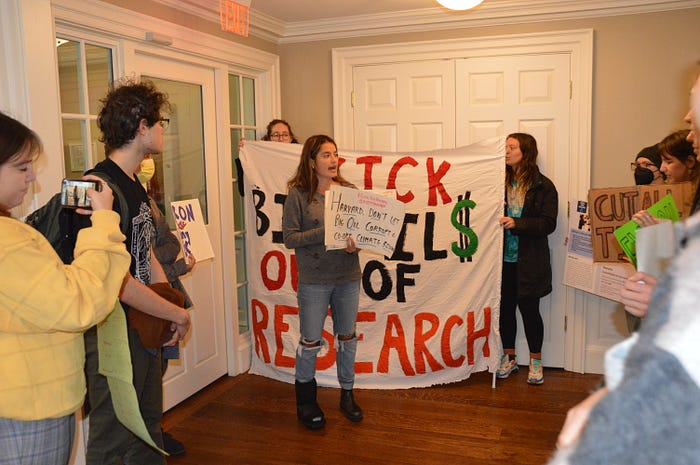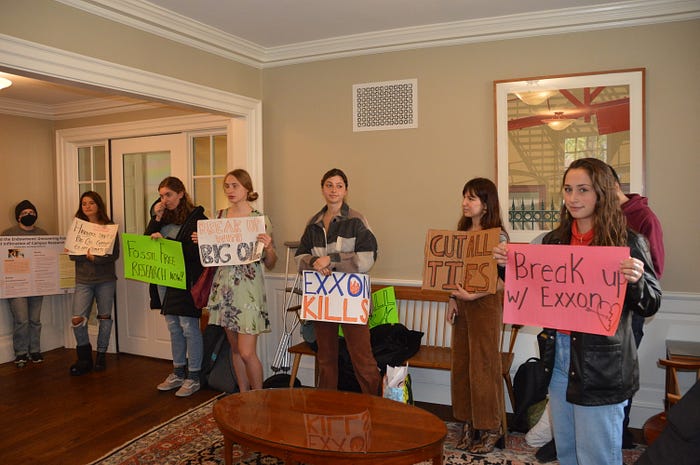Occupation Calls Out Big Oil’s Attacks on Academic Freedom
Administration won’t defend Harvard against Big Oil. So students are stepping up

CAMBRIDGE — This past week, students around the world staged coordinated actions calling for an end to Big Oil’s toxic presence on campus. On Thursday, Harvard students joined the call with an occupation of the university’s main administrative building. The demand was clear: that Harvard adopt a policy of fossil free research today, before Big Oil’s toxic assault on academic freedom damages the university beyond repair.
“It’s vital for Harvard to uphold truth as the standard for its students and faculty. But the idea of truth, of Veritas, at this institution is seriously in question if the environmental research it produces has conflicts of interest with the fossil fuel industry. For me, it is telling that we put Veritas on everything from our motto to our waffles, but can’t seem to uphold it where it matters most: in the research that has an impact on real-world decisions at a critical time,” said participant Aeden Marcus ‘25.
At the occupation, students shared speeches, songs, and “teach-in” style lessons on the dangers that Big Oil poses to Harvard’s academic interests. Phoebe Barr ’24 presented an academic research project on the scope of fossil fuel companies’ funding in Harvard’s climate programming. Harmony Fisher ’26 spoke on the ways in which Harvard’s actions harm vulnerable communities, students, and the intellectual community at Harvard. Sofia Andrade ’24 read from a report, released last year, revealing a troubling record of violations of Harvard’s conflict-of-interest policies when it comes to Big Oil’s presence on campus. To date, Harvard has taken no steps to rectify the rulebreaking and threats to academic autonomy identified in the report.
The action comes amidst growing evidence of Big Oil’s efforts to undermine academic freedom and shape the outcomes of scholarly research. A recently-released study by Columbia University economists found, via computational analysis techniques, that academic climate centers which accept natural gas funding produce research output which disproportionately favored natural gas interests and disproportionately criticize renewable energy. In some cases, the effect was so strong that natural gas favorability in output from university energy institutes was statistically indistinguishable from the output of natural gas lobbying groups.
Other events in these globally coordinated days of action included a rally by students at Dartmouth; an occupation of George Washington University’s Regulatory Studies Center, a heavily fossil fuel interest-funded policy research initiative; and protests at the University of Cambridge, Imperial College London, University of Toronto, Tufts University, and half a dozen more actions across continents. The actions were coordinated by the Fossil Free Research coalition, of which Fossil Fuel Divest Harvard is a founding member.
To date, over 750 leading academics, including over 100 Harvard faculty, have signed a landmark open letter warning that fossil fuel funding “compromises universities’ basic institutional integrity, academic freedom, and their ability to address the climate emergency.”
“Academic freedom is completely undermined when Big Oil dictates the terms of climate research,” said Libby Blanchard, a climate policy researcher affiliated with UC Berkeley. “Universities that fail to avoid conflicts of interest only squander their own potential to make a difference. We’re here because we know that academic institutions can and must do better — and that this begins with adopting a Fossil Free Research policy today. ”
As Harvard refuses to protect its own academic interests from the toxic grip of the fossil fuel industry, other peers are taking action. Last month, Princeton University announced that it would cut financial ties with over 90 fossil fuel companies, ending longstanding partnerships with companies like ExxonMobil and Total.

“Coming onto campus as a first-year, I’ve been greatly disappointed at the lack of climate focus here on campus. However, taking part in direct action gives me hope. Rallying for change with other students makes me believe in the future and in the power of our voices,” said Fisher.
Fossil Fuel Divest Harvard is the movement that successfully won the university’s commitment to divest from fossil fuels. To learn more, follow us on Twitter, Facebook, and Instagram. Harvard students, want to get involved in our student campaign? Email ffdivestharvard@gmail.com. Are you an alum? Check out DivestHarvardAlumni.com
